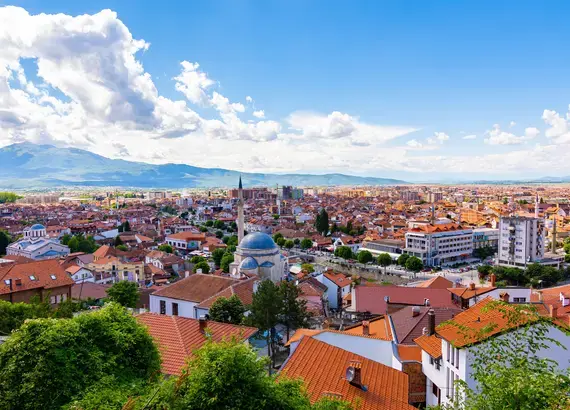
Success Story
Time to Conclude the 1990s Conflict in the Balkans
With all eyes on the crisis in Ukraine, the U.S. and Europe must not lose sight of their deep political and security interests in the Western Balkans, where U.S. and NATO interventions ended the violent conflicts of the 1990s. Make no mistake about it: the Kremlin aims to sever the Balkans from the West and to undermine democracy. To alter this dangerous dynamic, the U.S. must strengthen its leadership role to consolidate the Balkans’ place firmly in Europe.
Recognizing the stalled E.U. and NATO expansion processes, the U.S. must drive a bolder western response to the region’s stagnating economies and widespread corruption. The Biden Administration’s Global Democracy Summit offers an important framework to highlight the need for progress in having governments, including the U.S., hold themselves accountable to fulfill measurable commitments to advance democracy in the coming “year of action.” But more must be done to deliver democracy, integration and economic prosperity.
There has been significant progress in consolidating democracy across the six countries – Albania, Bosnia and Herzegovina, Kosovo, Montenegro, North Macedonia, and Serbia. But that progress is reversible given that threats to democracy are as serious as they have ever been since the wars of the 1990s ended. Autocracy and nationalism are rising, aided by Russia and China, rekindling conflict at a moment of European prevarication on enlargement. Increasing emigration is perhaps the most compelling indicator of people’s rejection of corruption, conflict, and lack of discernible advance. Another outbreak of conflict is not impossible, especially in Bosnia, where Bosnian Serb leadership continues to pursue secessionist policies that could spark violence. Citizens of North Macedonia are deeply frustrated by the lack of E.U. integration following a change in the name of the country to appease Greek concerns, only to find itself stymied similar issues with another EU member, Bulgaria. Serbia’s turn away from pluralism and democratic practice is sparking instability, especially among its youth. Kosovar youth are also losing faith in democracy. Democracy in the region is not fully achieved, allowing corruption, discrimination, and conflict to fester.
NDI’s public opinion research in the Western Balkans underscores these troubling trends. For instance, its 2021 regional poll found that trends since its last poll in 2018 are almost uniformly negative regarding support for democratic norms and citizens’ perception of foreign actors. Kosovo’s trends are less negative due to its strong support for the U.S.
Russia and China are pursuing aggressive disinformation campaigns promoting anti-Western and anti-democratic narratives that are changing public attitudes. As a result, more people are searching for geopolitical alternatives that serve as a “quick fix” to improve their quality of life, opening space for malign foreign influences and their disinformation narratives. Troublingly, they now support autocratic leadership and democracy equally. People no longer connect quality of life with democracy, or care where help comes from. Nor do they connect improvement of quality of their lives with the European integration process. Ultimately, the majority of people across the region are ready to sacrifice democracy for the improvement of quality of their life, even if it is not sustainable.
NDI has also researched the youth population in both Kosovo and Serbia and found disturbing factors in both countries, exacerbated by concerns about lack of employment opportunities and rising ethnic or nationalist tensions. Young people who have never lived among other ethnic groups, nor experienced the horrors of past conflicts, are particularly vulnerable to nationalistic narratives and radicalization. Throughout Kosovo, compared to older populations, ethnic Albanian and Serbian youth have less contact with each other and hold more negative views of each other, with more than half responding they do not have friends in the other communities. Perhaps most troubling, Kosovo's youth believe that the government has the right and the authority to censor the media breaching freedom of speech – a sentiment that can open the door to authoritarian government.
The U.S. and the E.U. must finish the work of the 1990s and ensure the Western Balkans are fully integrated and planted in the West. Especially given the stalled E.U. accession process, the U.S. must launch a campaign to counter Russian disinformation, Chinese investment, and rebuild pro-Western and pro-democratic narratives in the Western Balkans. Further investment in democracy development and processes is needed. Significant investment in infrastructure, connectivity, and small businesses is also urgently needed across the region. Youth must have the means and skills to improve their quality of life, engage in democratic institutions and systems, understand how to recognize and counter disinformation, and integrate with the rest of Europe. Kosovo, the lone country in the region without E.U. visa liberalization, must be granted this freedom to travel and work.
After 10 years, the Dialogue to normalize relations between Kosovo and Serbia should be brought to conclusion: taking advantage of the expected period of stability following last year’s elections in Kosovo; and following April elections in Serbia. Such a step is critical to paving both countries’ integration into the E.U. and promoting stability across the region. The U.S. should also lay out a clear plan for Kosovo’s entry into NATO, urging the four NATO members that do not recognize Kosovo that their futures are more secure with Kosovo and the region firmly embedded in Western Europe.
The Western Balkans remain a strategic vulnerability to the U.S. and Europe. We must use our full array of tools so that they are fully democratic and firmly anchored in the West.
Ambassador Nancy Soderberg is a former U.S. Deputy National Security advisor and an Ambassador to the United Nations. She currently serves as the National Democratic Institute’s Senior Director for Kosovo.
